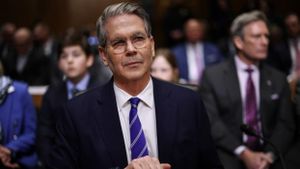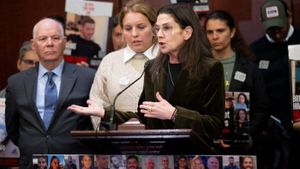U.S. President Donald Trump has announced his intention to suspend all future aid to South Africa, citing alleged mistreatment of certain classes of people and land confiscations as the core reasons behind this drastic move. This announcement, made via Trump’s Truth Social platform, has raised eyebrows both domestically and internationally, with significant ramifications for U.S.-South Africa relations.
On Sunday, Trump stated, "South Africa is confiscated land, and treating certain classes of people VERY BADLY." He emphasized the need for the United States to intervene, declaring, "The United States won't stand for it, we will act. Also, I will be cutting off all future funding to South Africa until a full investigation of this situation has been completed." These words set the stage for what Trump described as necessary actions to address alleged human rights violations.
While the details of Trump’s claims remain vague, he pointed to concerns surrounding land ownership and rights within the South African populace. The U.S. government has provided nearly $440 million to South Africa through various assistance programs, including humanitarian efforts, economic support, and healthcare initiatives.
Following the post, South African President Cyril Ramaphosa responded thoughtfully, aiming to clarify the country's position. He noted, "We look forward to engaging with the Trump administration over our land reform policy..." This response highlights South Africa's commitment to its constitutional framework and the rule of law, asserting, "The South African government has not confiscated any land." Ramaphosa seeks to facilitate dialogue around land reform, which has been contentious since apartheid's end.
The controversial land reform bill signed by Ramaphosa allows the government to claim land without compensation under specific circumstances, igniting fears reminiscent of Zimbabwe's land seizure crisis. The apartheid history paints a complex backdrop where land ownership is still predominantly held by white South Africans, decades after the racial tensions and segregation laws have officially ended.
Trump's allegations also coincide with historical grievances, particularly concerning the treatment of white farmers. His administration had previously expressed concerns about alleged violent land seizures. This issue has become increasingly charged, especially with the support from figures like tech billionaire Elon Musk, who has publicly backed Trump's stance on South Africa.
Reflecting on this situation, Ramaphosa confirmed during media interactions his assurance about the existing relationship between the U.S. and South Africa, asserting no significant funding was at risk apart from specific programs such as PEPFAR, which supports upwards of 17% of South Africa's HIV/AIDS initiatives.
Despite the absence of clear evidence to support Trump's claims, he insists they constitute serious violations of human rights. He remarked, "A massive Human Rights VIOLATION, at a minimum, is happening for all to see. The United States won't stand for it, we will act." These assertions suggest the potential recalibration of U.S.-African relations focused primarily on governance and rights.
The South African foreign ministry echoed this sentiment, emphasizing the importance of due diligence before making allegations: "We trust President Trump’s advisors will make use of the investigative period to attain a thorough under-standing of South Africa’s policies within the framework of constitutional democracy." This statement reflects both hope and skepticism about the outcome of such investigations.
Going forward, the broader repercussions from Trump's announcement could lead to increased tensions, particularly as South Africa navigates its policies during this period. Observers remain cautious about the fallout and its influence on global perceptions of U.S. foreign aid practices, especially concerning nations grappling with their historic challenges.
Trump’s rhetoric could intensify the focus on land reform, potentially aligning international opinions, as calls for humane treatment echo around the globe. The response from the South African government suggests they remain open to constructive dialogue, underscoring the necessity of communication amid rising geopolitical stakes.
This announcement does not just involve financial aid but reflects enduring tensions surrounding race, legacy of apartheid, and current governance issues. The world will be watching as this scenario continues to evolve, awaiting signals from both the Trump administration and the South African government on the next steps for their relationship.



